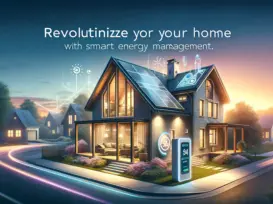Grus Home Energy - Sustainable Home Energy
Sustainable Home Energy
Sustainable home energy refers to the use of renewable resources and energy-efficient technologies to power residential properties. This approach aims to reduce the carbon footprint of homes while also lowering energy bills for homeowners. There are several key components to achieving sustainable home energy, including the use of solar panels, geothermal heating and cooling systems, energy-efficient appliances, smart home technology, and proper insulation.
One of the most popular and effective ways to implement sustainable home energy is through the installation of solar panels. Solar panels harness the power of the sun to generate electricity, which can be used to power the home’s appliances and lighting. Not only does this reduce reliance on fossil fuels, but it also can significantly lower electricity bills over time. In some cases, homeowners may even be able to sell excess energy back to the grid, further offsetting costs.
Another key component of sustainable home energy is the use of geothermal heating and cooling systems. These systems utilize the stable temperatures found below the earth’s surface to heat and cool the home, reducing the need for traditional HVAC systems that rely on fossil fuels. Geothermal systems are highly efficient and can drastically reduce energy consumption, leading to lower utility bills and a decreased environmental impact.
Energy-efficient appliances are also essential for achieving sustainable home energy. By investing in appliances that are ENERGY STAR certified, homeowners can significantly reduce their energy usage and costs. These appliances are designed to operate more efficiently, using less energy without sacrificing performance. From refrigerators and dishwashers to water heaters and HVAC systems, there are ENERGY STAR options available for virtually every household appliance.
In addition to solar panels, geothermal systems, and energy-efficient appliances, smart home technology can also play a key role in sustainable home energy. Smart thermostats, lighting systems, and home automation tools allow homeowners to monitor and control their energy usage in real-time, making it easier to identify areas where energy is being wasted and make adjustments accordingly. This level of automation can lead to significant energy savings over time.
Proper insulation is another crucial aspect of sustainable home energy. By ensuring that the home is well-insulated, homeowners can prevent energy loss through walls, windows, and doors. This helps to maintain a comfortable indoor temperature year-round without relying heavily on heating and cooling systems. Proper insulation can also improve indoor air quality and reduce noise pollution, making for a healthier and more comfortable living environment.
In conclusion, sustainable home energy is a holistic approach to reducing energy consumption, lowering utility bills, and minimizing the environmental impact of residential properties. By incorporating solar panels, geothermal systems, energy-efficient appliances, smart home technology, and proper insulation, homeowners can create a more sustainable and efficient living space for themselves and future generations.
Blog, Smart Home Automation , February 14, 2024 , Energy Consumption Monitoring, Energy Efficiency Improvements, HEMS, Home Energy Automation, Home Energy Management Systems, IoT Home Energy, Reduce Energy Costs Home, Renewable Energy Integration, Smart Energy Solutions, Smart Home Technology, Sustainable Home Energy
©2025 All Rights Reserved. Grus IoT Co.,Ltd.
